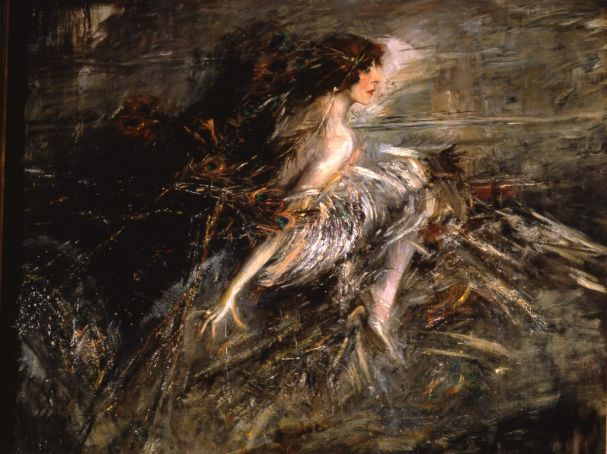Portrait of Marchesa Casati by Giovanni Boldini at Rome's Galleria Nazionale d'Arte Moderna.
Between 1911 and 1913, the Ferrara artist Giovanni Boldini worked on this exquisite portrait of Marchesa Luisa Casati (1881-1957), the eccentric Italian heiress, femme fatale, muse and renowned patron of the arts. Casati was feted by European high society and had her portrait painted numerous times during the first three decades of the 20th century by the greatest artists of the era, famously declaring: “I want to be a living work of art”.
In addition to captivating – and commissioning – leading artists, Casati seduced a succession of literary figures, including Gabriele D’Annunzio, and inspired numerous characters in print and film. Everywhere she went she was followed by an entourage of starry-eyed poets, sculptors, designers and occultists. Boldini came to know the spectacularly rich socialite in Venice, where she later acquired a Grand Canal residence, the Palazzo Venier dei Leoni – now the home of the Peggy Guggenheim Collection. Here Casati threw lavish, hedonistic parties, her guests attended by nude servants gilded in gold leaf.
Boldini captured Casati’s likeness several times, including his 1908 classical portrait with black hat and costume and matching sleek greyhound. However by the time he painted her again a few years later in Paris, the portrait was anything but traditional. He depicted the Marchesa with a spectacular headdress of peacock feathers, accentuating the birdlike poise of Casati who is perched amid a sea of swirling water, or rumpled sheets, with the suggestion of a ballgown and high heels. Half siren, half bird, she is an exotic creature ready to take flight into the silvery night sky.
It is clear the artist had much fun painting this refreshingly experimental image, so different to his other portraits which – although created using his trademark “swishy” brushstrokes – were more academic in their poses. No doubt Boldini was encouraged to be daring by the feather-loving Marchesa who relished appearing at society events wearing live snakes as jewellery, accompanied by her pair of jewel-collared cheetahs.
In 1931 Boldini died in Paris, aged 88, two years after the life-long bachelor and womaniser married for the first time. He left behind a glittering legacy, a Légion d’honneur medal and a large fortune.
The Marchesa, on the other hand, had by this stage amassed a debt of $25 million, leading to an auction of her personal belongings and treasures. Now almost penniless, she moved to a flat in the Knightsbridge area of London where, so the legend goes, she could be seen rummaging in bins for feathers to decorate her hair.
Casati died of a stroke in London in 1957, aged 76, and was buried in her leopard-skin finery complete with false eyelashes, alongside one of her beloved stuffed pekinese dogs. Among the tiny handful of mourners at the funeral was a man from Venice who, half a century earlier, had been her personal gondolier, ferrying the Marchesa and her pet monkeys across the lagoon.
Casati’s urn-like tombstone at Brompton Cemetery has her first name misspelt as “Louisa” and carries the Shakespearian inscription: “Age cannot wither her, nor custom stale her infinite variety”.
Boldini’s portrait of the colourful but ultimately tragic Casati was gifted to the Galleria Nazionale d’Arte Moderna (GNAM) by the painting’s owner Franco Palma in 1960.
Andy Devane
Photo: Roma, Galleria Nazionale d’Arte Moderna e Contemporanea. Su concessione del Ministero dei Beni e delle Attività Culturali e del Turismo.
General Info
View on Map
Giovanni Boldini's Portrait of Marchesa Casati
Viale delle Belle Arti, 131, 00197 Roma RM, Italy


















